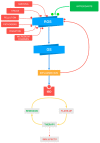Antioxidant Therapy in Inflammatory Bowel Diseases
- PMID: 33803138
- PMCID: PMC8000291
- DOI: 10.3390/antiox10030412
Antioxidant Therapy in Inflammatory Bowel Diseases
Abstract
Inflammatory bowel diseases (IBD) are a group of chronic, incurable diseases of the digestive tract, the etiology of which remains unclear to this day. IBD result in significant repercussions on the quality of patients' life. There is a continuous increase in the incidence and prevalence of IBD worldwide, and it is becoming a significant public health burden. Pharmaceuticals commonly used in IBD management, for example, mesalamine, sulfasalazine, corticosteroids, and others, expose patients to diverse, potentially detrimental side effects and frequently do not provide sufficient disease control. The chronic inflammation underlies the etiology of IBD and closely associates with oxidative/nitrosative stress and a vast generation of reactive oxygen/nitrogen species. Relative to this, several substances with antioxidant and anti-inflammatory properties are now intensively researched as possible adjunctive or independent treatment options in IBD. Representatives of several different groups, including natural and chemical compounds will be characterized in this dissertation.
Keywords: antioxidant therapy; antioxidants; inflammation; inflammatory bowel diseases; oxidative/nitrosative stress; reactive oxygen/nitrogen species.
Conflict of interest statement
The authors declare no conflict of interest.
Figures
References
-
- Molodecky N.A., Soon I.S., Rabi D.M., Ghali W.A., Ferris M., Chernoff G., Benchimol E.I., Panaccione R., Ghosh S., Barkema H.W., et al. Increasing incidence and prevalence of the inflammatory bowel diseases with time, based on sys-tematic review. Gastroenterology. 2012;142:46–54. doi: 10.1053/j.gastro.2011.10.001. - DOI - PubMed
-
- Beaugerie L., Brousse N., Bouvier A.M., Colombel J.F., Lemann M., Cosnes J., Hébuterne X., Cortot A., Bouhnik Y., Gendre J.P., et al. CESAME Study Group. Lymphoproliferative disorders in patients receiving thiopurines for inflammatory bowel disease: A prospective observational cohort study. Lancet. 2009;374:1617–1625. doi: 10.1016/S0140-6736(09)61302-7. - DOI - PubMed
Publication types
LinkOut - more resources
Full Text Sources
Other Literature Sources


